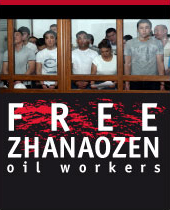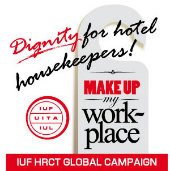 | WARNING: This is the OLD IUF website. Visit the NEW IUF website here: http://www.iuf.org |
Turkish unions - just competitive unionism or something else?
Last month global Unions Federations have just spent two days with affiliates in Istanbul talking about the major challenges facing Turkish workers and their unions. As ever many of the presentations were descriptive and a mixture of encouraging successes and challenging ongoing struggles. Struggles in the public sector have been going on for years and the brutality of the Turkish private sector employers are already well known. Added to that is now the new struggle Turkish domestic workers and their union confront with their organization currently facing a refusal of their registration and a typical fight for such workers to be recognized as workers and then have their organizations recognized as a union.
Turkish union activists face arbitrary dismissal (a rough calculation suggests two per hour throughout an average year), repression and discrimination on a scale that ranks close to the top of abusive practices by companies and governments in industrialized countries. The slow moving court system compounds weak, ineffective and often hostile labour laws and there is therefore little or no justice for Turkish workers found guilty of no more than exercising their rights. The text of an agreed press release by GUFs and ITUC can be found here.
One feature of the Turkish labour movement however that further holds back the fight for justice is the variance in the positioning of major Turkish union bodies about basic principles of rights and roles for unions. Ideological divergences amongst unions in countries are not uncommon. In continental Europe there are countries where unions co-exist despite different ideological histories or thinking. However in Turkey that is accompanied by a continuous, sometimes explicit and sometimes implicit assertion that one major and growing group, HAK-Is, has a closeness to the current governing party the AKP which raises questions about its status as an independent union organization. This of course raises questions beyond whether unions with differing ideologies can work together or achieve a level of unity at least around some common issues. It raises the more fundamental issue of whether there are shared basic and very critical values and of the independence of a major organization calling itself a union.
Whether these differences are those that arise from normal competitive unionism as we see in other countries or are difference of basic values that are hostile to the basic values of the labour movement is a question that needs to be answered going forward. If it is the latter then we would face a reality of one union organization colluding with a government party to destroy independent and democratic unions seen as too progressive and militant for the government's comfort.
Answering that question requires an assessment of the values and practices that drive all three of the main confederations and even their individual affiliates. DISK carries its credentials from a long historical struggle built on progressive positions and principles. It may, like all organizations, of course have its flaws but its basic values are difficult to challenge. TURK-Is is historically and still today a more conservative trade union centre and has on occasions rightly been questioned inside and outside Turkey in relation to its internal democracy and its willingness to actively defend workers within its membership. However despite its conservatism and even the positioning of some of its individual affiliates, TURK-Is, or at least a substantial number of its affiliates, can be considered to be working within the bounds of labour movement basic values and principles. The third major private sector national centre HAK-Is is where the most serious questions arise.
There is at least circumstantial evidence of tacit support from the AKP helping HAK-Is unions to progress in a number of sectors often at the expense of other unions. In some cases with direct state encouragement and in other cases with alleged support from government institutions or companies known to back the AKP. Whilst not someone who believes that where there is smoke there is always fire I feel that the constant assertions of an unacceptable relationship between HAK Is and AKP are worrying. Set against that of course are HAK-Is's credentials as an affiliate of both the ETUC and ITUC and the credentials of a number of its affiliates in GUFs or European Industry Union Federations.
An obvious question comes out of all that. Is there a contradiction between the alleged links between the AKP ad HAK Is, implicit or otherwise, and the legitimising that comes from membership of recognised international trade union organizations?
If there is no contradiction and we reject the allegations as being "normal" inter-union rivalry then we should move on. If on the other hand we believe there is substance to these allegations we need to think that through not only with Turkish members but also amongst the global union structures. Legitimating in any way national bodies that stand in the way of democratic and independent unions and their fight for rights and fairness at work is something no international union organization should do willingly. We need to make sure we are not doing so inadvertently either as a result of historical oversight or a lack of rigorous investigation into the democratic and independent credentials of the HAK Is confederation and presumably its affiliates.







